I need to run the code shown below (obtained from:Which Cipher Suites to enable for SSL Socket?).
The problem is that the code contains several methods named: createSocket with different argument types. The eclipse shows me error saying:

I read that Java can have multiple methods with same name as long as the arguments are different (method overloading). I do not know why this is causing me a problem here?
The code is:
class SSLSocketFactoryEx extends SSLSocketFactory
{
public SSLSocketFactoryEx() throws NoSuchAlgorithmException, KeyManagementException
{
initSSLSocketFactoryEx(null,null,null);
}
public SSLSocketFactoryEx(KeyManager[] km, TrustManager[] tm, SecureRandom random) throws NoSuchAlgorithmException, KeyManagementException
{
initSSLSocketFactoryEx(km, tm, random);
}
public SSLSocketFactoryEx(SSLContext ctx) throws NoSuchAlgorithmException, KeyManagementException
{
initSSLSocketFactoryEx(ctx);
}
public String[] getDefaultCipherSuites()
{
return m_ciphers;
}
public String[] getSupportedCipherSuites()
{
return m_ciphers;
}
public String[] getDefaultProtocols()
{
return m_protocols;
}
public String[] getSupportedProtocols()
{
return m_protocols;
}
public Socket createSocket(Socket s, String host, int port, boolean autoClose) throws IOException
{
SSLSocketFactory factory = m_ctx.getSocketFactory();
SSLSocket ss = (SSLSocket)factory.createSocket(s, host, port, autoClose);
ss.setEnabledProtocols(m_protocols);
ss.setEnabledCipherSuites(m_ciphers);
return ss;
}
public Socket createSocket(InetAddress address, int port, InetAddress localAddress, int localPort) throws IOException
{
SSLSocketFactory factory = m_ctx.getSocketFactory();
SSLSocket ss = (SSLSocket)factory.createSocket(address, port, localAddress, localPort);
ss.setEnabledProtocols(m_protocols);
ss.setEnabledCipherSuites(m_ciphers);
return ss;
}
public Socket createSocket(String host, int port, InetAddress localHost, int localPort) throws IOException
{
SSLSocketFactory factory = m_ctx.getSocketFactory();
SSLSocket ss = (SSLSocket)factory.createSocket(host, port, localHost, localPort);
ss.setEnabledProtocols(m_protocols);
ss.setEnabledCipherSuites(m_ciphers);
return ss;
}
public Socket createSocket(InetAddress host, int port) throws IOException
{
SSLSocketFactory factory = m_ctx.getSocketFactory();
SSLSocket ss = (SSLSocket)factory.createSocket(host, port);
ss.setEnabledProtocols(m_protocols);
ss.setEnabledCipherSuites(m_ciphers);
return ss;
}
public Socket createSocket(String host, int port) throws IOException
{
SSLSocketFactory factory = m_ctx.getSocketFactory();
SSLSocket ss = (SSLSocket)factory.createSocket(host, port);
ss.setEnabledProtocols(m_protocols);
ss.setEnabledCipherSuites(m_ciphers);
return ss;
}
private void initSSLSocketFactoryEx(KeyManager[] km, TrustManager[] tm, SecureRandom random)
throws NoSuchAlgorithmException, KeyManagementException
{
m_ctx = SSLContext.getInstance("TLS");
m_ctx.init(km, tm, random);
m_protocols = GetProtocolList();
m_ciphers = GetCipherList();
}
private void initSSLSocketFactoryEx(SSLContext ctx)
throws NoSuchAlgorithmException, KeyManagementException
{
m_ctx = ctx;
m_protocols = GetProtocolList();
m_ciphers = GetCipherList();
}
protected String[] GetProtocolList()
{
String[] preferredProtocols = { "TLSv1", "TLSv1.1", "TLSv1.2", "TLSv1.3" };
String[] availableProtocols = null;
SSLSocket socket = null;
try
{
SSLSocketFactory factory = m_ctx.getSocketFactory();
socket = (SSLSocket)factory.createSocket();
availableProtocols = socket.getSupportedProtocols();
Arrays.sort(availableProtocols);
}
catch(Exception e)
{
return new String[]{ "TLSv1" };
}
finally
{
if(socket != null)
socket.close();
}
List<String> aa = new ArrayList<String>();
for(int i = 0; i < preferredProtocols.length; i++)
{
int idx = Arrays.binarySearch(availableProtocols, preferredProtocols[i]);
if(idx >= 0)
aa.add(preferredProtocols[i]);
}
return aa.toArray(new String[0]);
}
protected String[] GetCipherList()
{
String[] preferredCiphers = {
// *_CHACHA20_POLY1305 are 3x to 4x faster than existing cipher suites.
// http://googleonlinesecurity.blogspot.com/2014/04/speeding-up-and-strengthening-https.html
// Use them if available. Normative names can be found at (TLS spec depends on IPSec spec):
// http://tools.ietf.org/html/draft-nir-ipsecme-chacha20-poly1305-01
// http://tools.ietf.org/html/draft-mavrogiannopoulos-chacha-tls-02
"TLS_ECDHE_ECDSA_WITH_CHACHA20_POLY1305",
"TLS_ECDHE_RSA_WITH_CHACHA20_POLY1305",
"TLS_ECDHE_ECDSA_WITH_CHACHA20_SHA",
"TLS_ECDHE_RSA_WITH_CHACHA20_SHA",
"TLS_DHE_RSA_WITH_CHACHA20_POLY1305",
"TLS_RSA_WITH_CHACHA20_POLY1305",
"TLS_DHE_RSA_WITH_CHACHA20_SHA",
"TLS_RSA_WITH_CHACHA20_SHA",
// Done with bleeding edge, back to TLS v1.2 and below
"TLS_ECDHE_ECDSA_WITH_AES_256_CBC_SHA384",
"TLS_ECDHE_RSA_WITH_AES_256_CBC_SHA384",
"TLS_ECDHE_ECDSA_WITH_AES_128_CBC_SHA256",
"TLS_ECDHE_RSA_WITH_AES_128_CBC_SHA256",
"TLS_ECDHE_RSA_WITH_AES_256_GCM_SHA384",
"TLS_DHE_DSS_WITH_AES_256_GCM_SHA384",
"TLS_ECDHE_RSA_WITH_AES_128_GCM_SHA256",
"TLS_DHE_DSS_WITH_AES_128_GCM_SHA256",
// TLS v1.0 (with some SSLv3 interop)
"TLS_DHE_RSA_WITH_AES_256_CBC_SHA384",
"TLS_DHE_DSS_WITH_AES_256_CBC_SHA256",
"TLS_DHE_RSA_WITH_AES_128_CBC_SHA",
"TLS_DHE_DSS_WITH_AES_128_CBC_SHA",
"TLS_DHE_RSA_WITH_3DES_EDE_CBC_SHA",
"TLS_DHE_DSS_WITH_3DES_EDE_CBC_SHA",
"SSL_DH_RSA_WITH_3DES_EDE_CBC_SHA",
"SSL_DH_DSS_WITH_3DES_EDE_CBC_SHA",
// RSA key transport sucks, but they are needed as a fallback.
// For example, microsoft.com fails under all versions of TLS
// if they are not included. If only TLS 1.0 is available at
// the client, then google.com will fail too. TLS v1.3 is
// trying to deprecate them, so it will be interesteng to see
// what happens.
"TLS_RSA_WITH_AES_256_CBC_SHA256",
"TLS_RSA_WITH_AES_256_CBC_SHA",
"TLS_RSA_WITH_AES_128_CBC_SHA256",
"TLS_RSA_WITH_AES_128_CBC_SHA"
};
String[] availableCiphers = null;
try
{
SSLSocketFactory factory = m_ctx.getSocketFactory();
availableCiphers = factory.getSupportedCipherSuites();
Arrays.sort(availableCiphers);
}
catch(Exception e)
{
return new String[] {
"TLS_DHE_DSS_WITH_AES_128_CBC_SHA",
"TLS_DHE_DSS_WITH_AES_256_CBC_SHA",
"TLS_DHE_RSA_WITH_AES_128_CBC_SHA",
"TLS_DHE_RSA_WITH_AES_256_CBC_SHA",
"TLS_RSA_WITH_AES_256_CBC_SHA256",
"TLS_RSA_WITH_AES_256_CBC_SHA",
"TLS_RSA_WITH_AES_128_CBC_SHA256",
"TLS_RSA_WITH_AES_128_CBC_SHA",
"TLS_EMPTY_RENEGOTIATION_INFO_SCSV"
};
}
List<String> aa = new ArrayList<String>();
for(int i = 0; i < preferredCiphers.length; i++)
{
int idx = Arrays.binarySearch(availableCiphers, preferredCiphers[i]);
if(idx >= 0)
aa.add(preferredCiphers[i]);
}
aa.add("TLS_EMPTY_RENEGOTIATION_INFO_SCSV");
return aa.toArray(new String[0]);
}
private SSLContext m_ctx;
private String[] m_ciphers;
private String[] m_protocols;
}
EDIT: I tried to use @override before the concerned method:
@Override
public Socket createSocket(Socket s, String host, int port, boolean autoClose) throws IOException
{
SSLSocketFactory factory = m_ctx.getSocketFactory();
SSLSocket ss = (SSLSocket)factory.createSocket(s, host, port, autoClose);
ss.setEnabledProtocols(m_protocols);
ss.setEnabledCipherSuites(m_ciphers);
return ss;
}
Nothing has changed, the problem still exists.
Also, please, note that at the end of the code, there is this part:
@Override
public Socket createSocket(Socket arg0, String arg1, int arg2, boolean arg3)
throws IOException {
// TODO Auto-generated method stub
return null;
}
The error has disappeared when I commented that method. The SSLFactory is built in class. How can I rerach it to check its code?